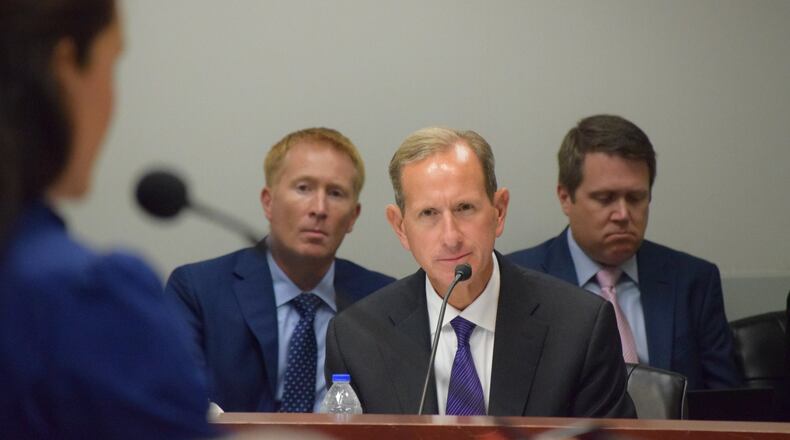Two Georgia nonprofits say they have teamed up to hold elected state regulators accountable for oversight of Georgia Power and the rates it charges consumers. But their press conference to announce the partnership was bumped by the commission they intend to watchdog.
A short time before the press conference, the Georgia Public Service Commission’s chairman reversed an earlier decision to make a PSC conference room available for the nonprofits’ Monday event.
William Perry of the Georgia Ethics Watchdogs Education Fund and Brionté McCorkle of Georgia Conservation Voters Education Fund held the gathering outside instead.
Perry said word of the PSC’s change came shortly after he emailed a press release detailing their proposed efforts to hold the PSC more accountable. If the PSC’s reversal wasn’t tied to his press release, “it is an incredible coincidence,” he said.
PSC Chairman Lauren “Bubba” McDonald did not return Atlanta Journal-Constitution calls after the end of a PSC hearing Tuesday.
Tom Krause, the PSC’s public information officer, said the decision had “nothing to do with who the group was or what they were talking about.” Krause said he had been unaware of the organization’s PSC accountability focus until told by an Atlanta Journal-Constitution reporter.
Instead, he said, staff members had raised concerns with McDonald about allowing any outside group to hold a press conference in the PSC’s offices, which Krause said had not been done before.
“If we let them do it, the Sierra Club will want to do it. Georgia Power would want to do it, and if some undesirable group such as a neo-Nazi group would want to do it, it would be tough with the precedent set legally to say, ‘No,’” he said.
The PSC, whose members are elected, isn't well known among many Georgians. But its decisions on energy issues affect what Georgia Power charges customers in monthly electric bills and what the company builds — including the overbudget and deeply delayed nuclear expansion of Plant Vogtle.
In December, the PSC is expected to vote on a rate increase proposed by Georgia Power as well as one requested by sister company Atlanta Gas Light, which charges more than a dozen natural gas marketers fees, which are passed on to customers.
Georgia Power and AGL have said the increases are necessary to cover costs and pay for important expenses, such as improving system reliability, safety and storm recovery.
The new watchdog effort is focused on the PSC’s oversight of Georgia Power’s rates, the Vogtle expansion and costs associated with cleanups of coal ash at Georgia Power plants.
“We are definitely questioning the actions of Georgia Power and what the Georgia Public Service Commission has allowed them to do,” said McCorkle of the Georgia Conservation Voters Education Fund.
The organizations have a web page — www.DontRaiseMyBill.com — to show what it says would be the impact of Georgia Power’s proposed rate increase. They also said they plan to create a web page to show gifts and campaign contributions to PSC commissioners “from those representing or benefiting from regulated entities.”
About the Author
The Latest
Featured



